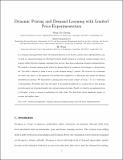| dc.contributor.author | Cheung, Wang Chi | |
| dc.contributor.author | Simchi-Levi, David | |
| dc.contributor.author | Wang, He | |
| dc.date.accessioned | 2018-11-16T19:11:55Z | |
| dc.date.available | 2018-11-16T19:11:55Z | |
| dc.date.issued | 2017-11 | |
| dc.identifier.issn | 0030-364X | |
| dc.identifier.issn | 1526-5463 | |
| dc.identifier.uri | http://hdl.handle.net/1721.1/119156 | |
| dc.description.abstract | In a dynamic pricing problem where the demand function is not known a priori, price experimentation can be used as a demand learning tool. Existing literature usually assumes no constraint on price changes, but in practice, sellers often face business constraints that prevent them from conducting extensive experimentation. We consider a dynamic pricing model where the demand function is unknown but belongs to a known finite set. The seller is allowed to make at most m price changes during T periods. The objective is to minimize the worst-case regret—i.e., the expected total revenue loss compared with a clairvoyant who knows the demand distribution in advance. We demonstrate a pricing policy that incurs a regret of O(log(m)T), or m iterations of the logarithm. Furthermore, we describe an implementation of this pricing policy at Groupon, a large e-commerce marketplace for daily deals. The field study shows significant impact on revenue and bookings. | en_US |
| dc.language.iso | en_US | |
| dc.publisher | Institute for Operations Research and the Management Sciences (INFORMS) | en_US |
| dc.relation.isversionof | http://dx.doi.org/10.1287/opre.2017.1629 | en_US |
| dc.rights | Creative Commons Attribution-Noncommercial-Share Alike | en_US |
| dc.rights.uri | http://creativecommons.org/licenses/by-nc-sa/4.0/ | en_US |
| dc.source | Prof. Simchi-Levi via Elizabeth Soergel | en_US |
| dc.title | Technical Note—Dynamic Pricing and Demand Learning with Limited Price Experimentation | en_US |
| dc.type | Article | en_US |
| dc.identifier.citation | Cheung, Wang Chi, et al. “Technical Note—Dynamic Pricing and Demand Learning with Limited Price Experimentation.” Operations Research, vol. 65, no. 6, Dec. 2017, pp. 1722–31. | en_US |
| dc.contributor.department | Massachusetts Institute of Technology. Department of Civil and Environmental Engineering | en_US |
| dc.contributor.department | Massachusetts Institute of Technology. Institute for Data, Systems, and Society | en_US |
| dc.contributor.department | Massachusetts Institute of Technology. Operations Research Center | en_US |
| dc.contributor.approver | David Simchi-Levi | en_US |
| dc.contributor.mitauthor | Cheung, Wang Chi | |
| dc.contributor.mitauthor | Simchi-Levi, David | |
| dc.contributor.mitauthor | Wang, He | |
| dc.relation.journal | Operations Research | en_US |
| dc.eprint.version | Original manuscript | en_US |
| dc.type.uri | http://purl.org/eprint/type/JournalArticle | en_US |
| eprint.status | http://purl.org/eprint/status/NonPeerReviewed | en_US |
| dspace.orderedauthors | Cheung, Wang Chi; Simchi-Levi, David; Wang, He | en_US |
| dspace.embargo.terms | N | en_US |
| dc.identifier.orcid | https://orcid.org/0000-0003-2809-9623 | |
| dc.identifier.orcid | https://orcid.org/0000-0002-4650-1519 | |
| dc.identifier.orcid | https://orcid.org/0000-0001-7444-2053 | |
| mit.license | OPEN_ACCESS_POLICY | en_US |
